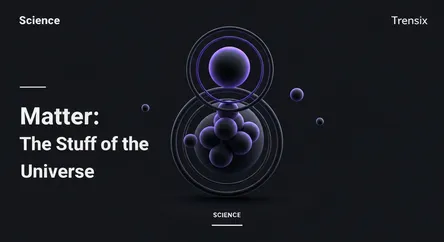Science
Matter: The Stuff of the Universe

A simple guide to understanding matter, the physical substance that makes up everything in the universe, from solids and liquids to exotic states.
What is it?
Matter is the "stuff" that makes up the universe. The defining properties of matter are that it has mass and it takes up space (volume). Everything you can touch and see is made of matter. The fundamental building blocks of matter are atoms, which are themselves composed of smaller particles like protons, neutrons, and electrons. Matter commonly exists in four states: solid, liquid, gas, and plasma. For example, water can be a solid (ice), a liquid (water), or a gas (steam). Plasma, an ionized gas, is the most abundant state of matter in the universe, found in stars.
Why is it trending?
While a fundamental concept, the study of matter is constantly evolving. Scientists are pushing the boundaries of knowledge, exploring exotic states like Bose-Einstein condensates in labs. Furthermore, the biggest mysteries in cosmology revolve around matter. The ongoing search for "dark matter" and "dark energy," which are believed to constitute over 95% of the universe but cannot be directly observed, keeps the topic at the forefront of scientific research and public fascination. Advancements in particle physics continue to reveal deeper secrets about matter's composition.
How does it affect people?
Matter affects everyone because we are made of it, and so is our world. The air we breathe, the food we eat, the homes we live in, and the technology we use are all composed of matter. Understanding its properties is the foundation of chemistry, physics, and engineering. This knowledge allows us to create new materials, develop life-saving medicines, and harness energy. From the silicon in our smartphones to the concrete in our buildings, our entire civilization is built upon our ability to manipulate and comprehend matter.